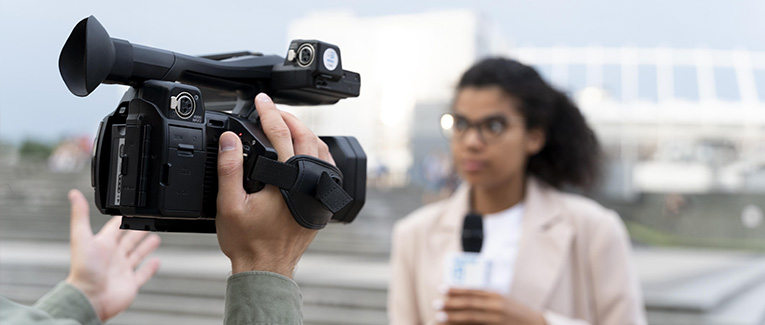
A media visa (I visa) is a nonimmigrant visa for foreign media persons traveling to the U.S. engaging in their profession, and have their home office in a foreign country. While issuing the media visa, the consular officer will consider whether the applicant’s own government grants similar privileges, or is reciprocal to representatives of the media or press from the U.S. and follows appropriate procedures.
A media visa is for “representatives of the foreign media” such as members of the press, film, radio or print industries, whose activities are necessary to the function of the foreign media such as reporters, film crews, editors and other persons in similar occupations. They need a media visa when traveling to the U.S. to engage in their profession.
Media persons that want to temporarily engage in their profession in the U.S. can NOT enter under the Visa Waiver Program (VWP), even if he/she is a citizen of a country participating in the VWP program. Such a person must obtain a media visa first.
Foreign media representatives covering the United Nations do not need an I visa.
An I visa can normally be obtained directly from the U.S. embassy/consulate, without first filing a separate petition with the USCIS.
An I visa is generally issued for one year. Extensions in one year increments can be issued, and there is no limit on the number of extensions. Revalidation of the I visa stamp cannot be performed while in the U.S. Visa stamping must be done outside the U.S. if an I visa status was extended, but the I visa stamp has expired and such person wants to travel outside the U.S. and enter again.
The I visa holder can work only for the employer that submitted the I visa application for which the approval was granted.
The I visa holder can study in the U.S. by taking a few credits at a University as long as it does not harm the primary purpose of the visa. An I visa holder can’t study full time like F1 visa holders.
If an I visa holder wants to change jobs, he/she can apply for a change of status by having his/her employer file Form I-129, Petition for Nonimmigrant Worker, at the USCIS Service Center with jurisdiction over the case.
Dependent Spouse and Children
Spouse and unmarried children under the age of 21 years (dependents) who wish to accompany or join the primary media visa holder in the U.S. for the duration of his/her stay can apply for a derivative I visa.
Dependent media visas are not available to a fiancée/fiancé, parents, in-laws, or other relatives.
Application Procedure:
It is the same as a primary media visa applicant. However, if the dependents apply for a visa at a later date and not at the same time as the primary applicant, they must provide a copy of the primary visa holder’s media visa.
Rights and Restrictions:
Dependents of a media visa holder are not allowed to work in the U.S. unless they obtain the appropriate work visa.
Dependents of media visa holders can study in the U.S. without applying for a student (F-1) visa.
Dependents that don’t intend to stay in the U.S. with the primary visa holder, but are visiting the U.S. separately for vacation purposes should apply for a visitor visa, instead of a dependent media visa. They can NOT enter under the Visa Waiver Program.

